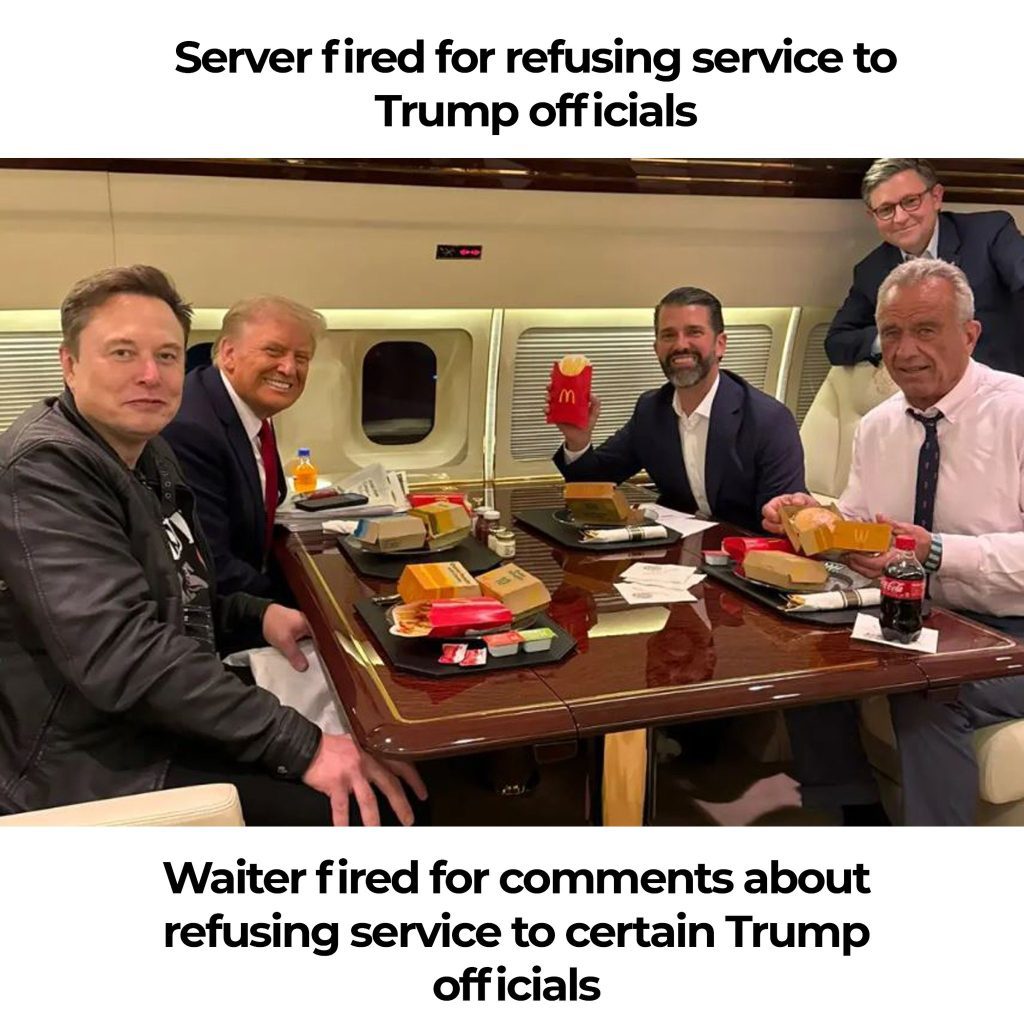In a time when politics and personal beliefs are more public than ever, the line between professional responsibility and personal conviction is being tested daily. The latest flashpoint? A Washington, D.C. server who found herself out of a job after publicly stating that she would refuse to serve officials from the Trump administration. Her comments, made in an interview with The Washingtonian, quickly went viral—and so did the controversy.
The result? Suzannah Van Rooy, a server at Beuchert’s Saloon, was promptly fired. The restaurant responded with a firm statement condemning her actions, igniting a fiery debate about free speech, workplace conduct, and political tolerance.
Let’s break down what happened, why it matters, and what it says about working in today’s divided political landscape.

The Comments That Sparked It All
Suzannah Van Rooy had strong opinions—and she didn’t hide them. In her interview, she explained that she wouldn’t feel comfortable serving Trump administration officials whom she believed to be morally reprehensible.
“It’s not, ‘Oh, we hate Republicans,’” she clarified. “It’s that this person has moral convictions that are strongly opposed to mine, and I don’t feel comfortable serving them.”
She specifically called out individuals involved in deportation policies and sex trafficking scandals, stating that her refusal wasn’t based on party affiliation, but on ethics.
But those comments weren’t just a personal stance—they were tied to her role as a server at a popular Capitol Hill restaurant, and that’s where the backlash began.
Video: Waiter Fired for Refusing Service to Trump Officials
Beuchert’s Saloon Responds: Zero-Tolerance for Discrimination
After Van Rooy’s statements went public, Beuchert’s Saloon moved fast. In a public statement, the restaurant condemned her remarks, saying they went against the values of the establishment and violated their zero-tolerance discrimination policy.
“Her remarks were reprehensible and do not reflect the values of our establishment,” the official response read.
What really escalated the situation, however, was Van Rooy’s alleged use of the restaurant’s social media accounts without permission. According to management, she logged in during the middle of the night and posted offensive replies to public comments about her interview.
“She has no authority to speak on our behalf,” the restaurant said, adding that her posts deeply offended members of the staff and the community.

Immediate Termination: Where Professionalism Meets Personal Opinion
By Friday, Beuchert’s confirmed that Van Rooy had been fired, citing not just her public comments but also her unauthorized access to the business’s digital platforms.
“Our staff and families—many of whom are personally offended by Ms. Van Rooy’s comments—are still reeling from what she said and did,” the statement continued. “We as a restaurant are simply horrified to be associated with base prejudice.”
This wasn’t just about one comment. For Beuchert’s, it was about maintaining an inclusive environment for all customers—regardless of political affiliation.

The Public Reaction: Free Speech or Fireable Offense?
As you might imagine, the internet exploded. Some hailed the restaurant for standing by its policies and ensuring all guests feel welcome. Others blasted them for what they saw as punishing a worker for exercising her right to free speech.
“She should’ve been allowed to have an opinion,” one commenter wrote.
“It’s a private business—they can fire her if she represents them poorly,” countered another.
This incident has become another example of the culture clash between personal beliefs and professional boundaries. While Van Rooy didn’t physically refuse service, her public vow to do so was seen by many as crossing a line—especially in an industry that thrives on customer service.

The Bigger Picture: Politics in the Workplace
This isn’t the first time a restaurant has found itself in the political spotlight. Back in 2018, Sarah Huckabee Sanders was famously asked to leave a Virginia restaurant over her role in the Trump administration. Since then, the debate over whether service industry workers should accommodate political figures they disagree with has only intensified.
So where’s the line? Can a business enforce neutrality among its staff? Or should employees be allowed to draw boundaries based on their own ethics?
In Van Rooy’s case, the issue wasn’t just her opinion—it was that she tied those opinions to her workplace and used the restaurant’s resources to voice them.
Video: Several senior NSC staffers fired by Trump administration, U.S. officials say
Beuchert’s Reaffirms Its Values
Amid the backlash, Beuchert’s Saloon reiterated its commitment to inclusivity and respect. The restaurant emphasized that they welcome all guests and do not allow any form of prejudice or discrimination.
“We treat all customers with dignity, regardless of their background, beliefs, or politics,” the statement said.
They also invited the public to continue visiting the restaurant, making it clear that their doors are open to everyone—as long as respect is mutual.

Conclusion: A Complicated Lesson in Expression and Employment
Suzannah Van Rooy’s firing is more than just a headline—it’s a case study in how personal values clash with professional responsibilities. In an age where social media amplifies every word, employees are walking a fine line between freedom of speech and company representation.
While some see Van Rooy as a principled individual standing her ground, others view her as someone who crossed a line by bringing politics into a service-oriented business.
At the heart of it all lies a critical question for our time: How do we balance free expression with professional conduct in an era defined by deep political divides?
The answer isn’t simple—but the conversation is essential.